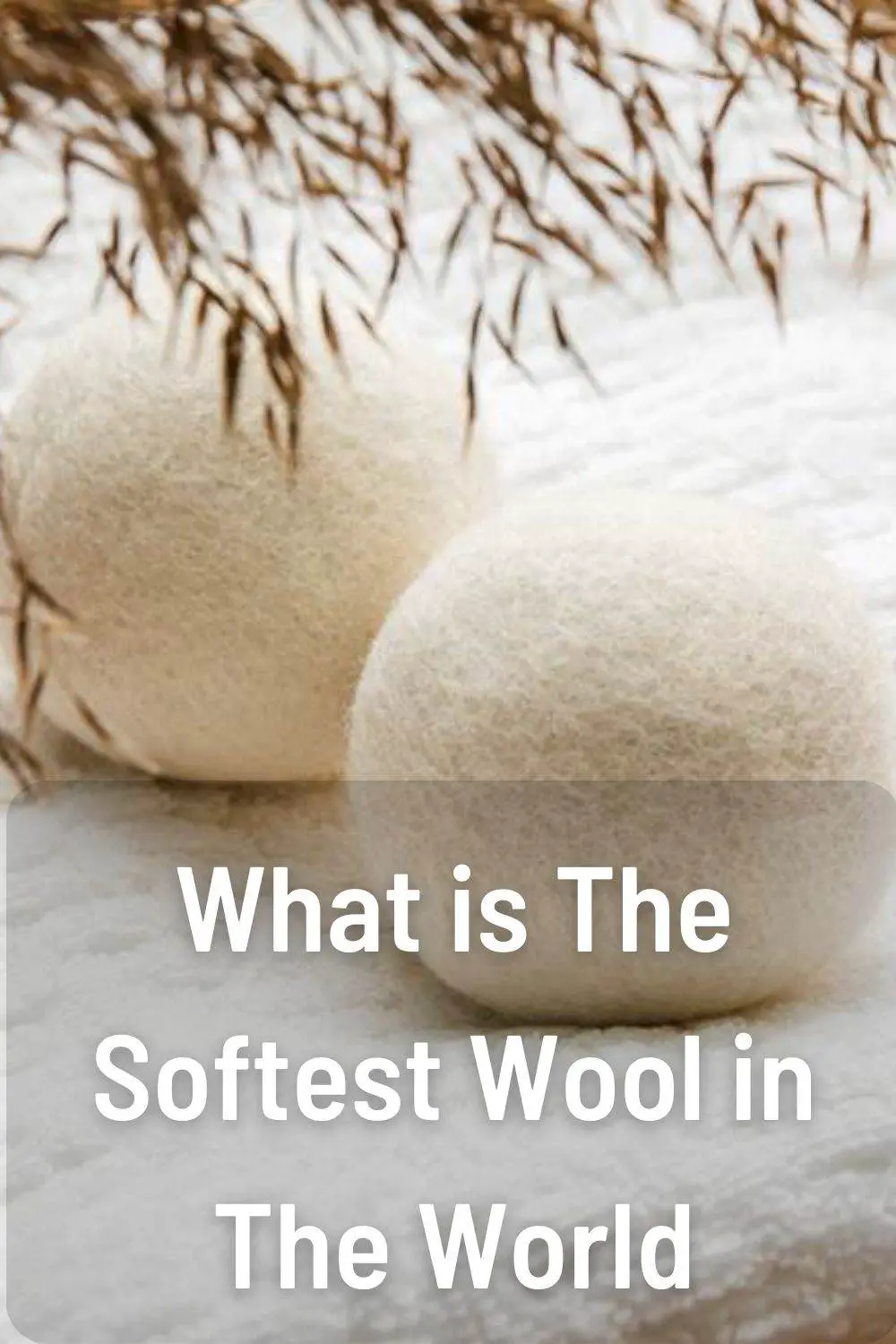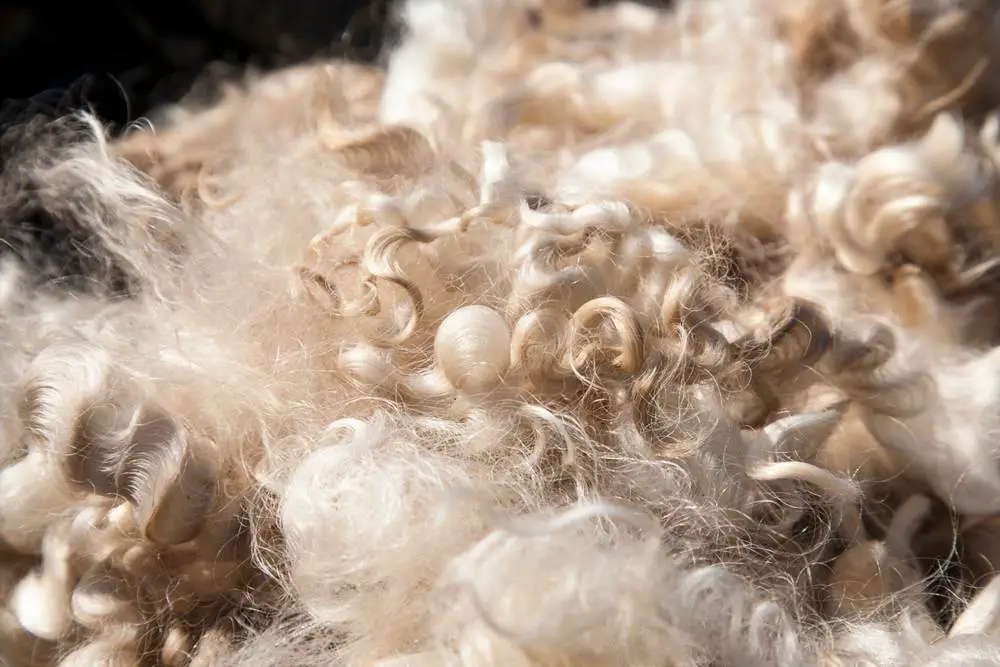
Wool is one of the most popular and versatile natural fibers used for clothing, and different types of wool have varying softness, durability, and warmth. Determining the softest wool in the world requires examining some key factors.
Table of Contents
How Wool Softness is Measured
The softness of wool is primarily determined by the diameter of the wool fibers. The lower the micron measurement, the finer and softer the wool. Here are the main micron measurements used to classify wool:
- Ultrafine – under 17.5 microns
- Superfine – 18 to 19.9 microns
- Fine – 20 to 24.9 microns
- Medium – 25 to 31.9 microns
- Coarse – 32 to 39.9 microns
- Very Coarse – Over 40 microns
The finest wools, such as Merino with an average of 24 microns, have the smallest fiber diameters and feel silky soft to the touch. Coarser wools like Cheviot (31 microns) are thicker and rougher in texture.
Key Factors in Wool Softness
Fiber Diameter – The smaller the fiber diameter, the softer the wool. Ultrafine Merino wool can be as fine as 10-15 microns.
Crimp – The natural kink and waviness of the wool fibers creates bulkiness for insulation and elasticity for softness. Fine wool has a higher crimp and more elasticity.
Staple Length – Longer wool fibers (over 5 inches) tend to be softer than shorter fibers. Merino wool has a long staple length.
Fiber Curvature – Fine fibers with a lot of crimp have higher curvature, increasing softness and comfort.
Handle – The bulkiness and resilience of the processed wool sliver determines the handle or feel. Fine wool has a smooth, supple handle.
Purity – Wool with higher purity and less vegetable matter contamination will feel softer. Ultrafine Merino is carefully scoured and has high purity.
Fineness – The finest and purest wool, especially with the highest amount of crimp, feels the softest.
The Softest Types of Wool

Taking into account the factors above, these are some of the softest types of wool globally:
Merino Wool
Merino wool is hands-down the softest and finest wool available. It comes from Merino sheep bred in Australia and New Zealand to produce a fleece of exceptional fineness, purity, and softness.
- Fiber Diameter – Ultrafine Merino can be under 15 microns, while Superfine Merino ranges from 18-19 microns.
- Staple Length – Merino has a long staple length of 3-6 inches.
- Crimp – Merino has a very high crimp frequency of up to 100 crimps per inch, adding softness.
- Purity – Ultrafine Merino goes through extensive processing to remove impurities.
With an unparalleled combination of softness, lightweight warmth, breathability and comfort, Merino wool makes incredibly fine, soft sweaters, base layers, and underwear.
Vicuña Wool
Vicuña wool comes from the rare and protected Vicuña animal native to the Andes Mountains in South America. It is incredibly fine and soft.
- Fiber Diameter – Vicuña wool averages just 12 microns in diameter, even finer than Merino.
- Handle – Lightweight and luxuriously soft to the touch.
- Scarcity – There are only about 200,000 Vicuñas in the wild, making the wool scarce and highly prized.
- Price – Considered the most expensive wool in the world, Vicuña wool sells for $600-$3000 per yard.
With demand exceeding supply, Vicuña wool is reserved for the most exclusive garments and fabrics. It offers unmatched softness for those willing to pay top dollar.
Qiviut Wool
Shed naturally by muskoxen in the Arctic, Qiviut (pronounced kiv-ee-ute) wool is an extraordinarily soft and warm downy underwool.
- Fiber Diameter – Qiviut averages just 16-19 microns, similar to Vicuña wool.
- Warmth – Eight times warmer than sheep’s wool due to its low conductivity.
- Softness – Qiviut lacks prickly outer guard hairs and is incredibly soft and lightweight.
- Downy – The undercoat fibers are fluffy like down feathers.
- Scarcity – Qiviut is shed in small quantities and hand gathered wild or combed.
Qiviut is among the rarest natural animal fibers due to the small muskox population. It is sold as a luxury wool for knitting accessories, blankets and baby items.
Cashmere Wool
Cashmere wool comes from Cashmere and other special breeds of goats. It is known for its exceptionally soft, luxurious feel.
- Fiber Diameter – Cashmere wool is usually 14-19 microns.
- Lightweight – Cashmere provides warmth without weight.
- Soft Handle – Cashmere feels buttery soft to the touch yet durable.
- Scarcity – It takes 4 years to gather enough fibers needed for a cashmere sweater.
The soft, fine fibers of Cashmere lend well to sweaters, scarves, gloves and other accessories with direct skin contact. It is widely regarded as one of the most luxurious types of wool.
Alpaca Wool
Alpaca wool comes from alpacas grazing the Andes Mountains of South America. It is renowned for its soft, silky hand and warmth.
- Fiber Diameter – Alpaca wool is typically 20-25 microns
- Crimp – It has good natural crimp for elasticity and softness.
- Hypoallergenic – Alpaca lacks lanolin so is hypoallergenic.
- Luxurious – High quality Alpaca has a luxuriously soft, almost silky hand.
Alpaca fiber is made into soft sweaters, blankets, and other apparel using the finest grade of fibers. It offers great softness, luxury, and warmth.
Angora Wool
Angora wool comes from special breeds of Angora rabbits. The fibers are incredibly fine, light, fluffy and soft.
- Fiber Diameter – Angora wool is around 10-13 microns.
- Crimp – Angora has a high natural crimp.
- Soft – Angora lacks coarse guard hairs and is extraordinarily soft.
- Warm – The fluffy fibers provide light, efficient warmth.
- Luxurious – Angora feels rich and silky smooth.
Angora remains a niche luxury fiber, with the rabbits sheared for their soft fur. Angora wool is used to make soft sweaters, accessories, and baby apparel.
Bison Down Wool
Bison down is the fine undercoat shed by bison. It rivals cashmere for being incredibly lightweight yet warm.
- Fiber Diameter – Bison down is around 18-25 microns.
- Downy – The fibers are fluffy like down feathers.
- Softness – Bison down is very fine and soft without guard hairs.
- Rare – Only sheds 100-200 grams per animal per year.
This rare downy wool comes only from North American bison herds. The soft undercoat is combed and sold for limited edition textiles.
Factors Affecting Wool Softness
Beyond the natural properties of the animal fibers, the following factors during processing play a key role in determining wool softness:
Washing Process
Wool is scoured in a series of hot baths to remove lanolin and impurities. How thoroughly the wool is scoured and rinsed affects purity.
Carding Process
Carding aligns the wool fibers and removes remaining impurities to produce a smooth, uniformed sliver.
Spinning Method
Worsted spinning keeps fibers straighter and aligned for a smooth, pure yarn. Woolen spinning creates a softer, bulkier, more textured yarn by allowing fibers to remain disorganized.
Fineness of Yarn
The finer the wool yarn, the softer the resulting fabric. Merino wool can be spun into yarns as fine as 18-23 microns for ultra softness.
Fabric Weave and Finishes
Tighter woven fabrics feel crisper and smoother. Loose weaves like knits allow more loft and softness. Certain finishes like fulling and brushing also enhance softness.
Dyeing and Treatment
Some processing methods like chlorine bleach and high temperature drying can damage wool fibers and decrease softness. Gentler, eco-friendly methods help preserve softness.
Maximizing Wool Softness
Brands producing the softest wool garments pay special attention to sourcing the finest wool fibers and utilizing processing methods that retain softness. Here are some best practices they follow:
- Source the finest wool grades available – Ultrafine Merino, Vicuña, Qiviut, etc.
- Keep wool fibers as long as possible during processing.
- Utilize chemical free, eco-friendly production methods.
- Minimize high temperature drying and other damaging mechanical processes.
- Blend wool with silk, cashmere or cotton for enhanced softness.
- Wash final products gently with mild detergent to maintain softness.
Thoughtful selection of the finest raw wool fibers combined with gentle processing and care preserves the soft luxurious feel that makes the finest wool so covetable and comfortable against the skin.
Conclusion
Determining the softest wool requires looking at the key characteristics of fiber diameter, staple length, crimp, purity and overall handle. When all these factors are considered, the finest grades of Merino wool, including Ultrafine and Superfine Merino, stand out as likely the softest wool available in the world today. Merino wool combines an exceptionally fine fiber diameter under 19 microns with a naturally high crimp and excellent purity through extensive processing. Other ultrafine fibers like Vicuña and Qiviut may match or slightly exceed Merino in places, but remain limited in supply. For all around availability, versatility and softness, top-quality Merino remains clearly the softest wool you can find and wear.
Frequently Asked Questions
What makes wool soft?
The main factor determining wool softness is the fiber diameter. Finer fibers with smaller micron measurements feel softer. Additional factors like crimp, staple length, purity and handle also affect the hand feel.
Why is Merino wool so soft?
Merino wool fibers are extremely fine at under 19 microns for Superfine Merino. The small fiber diameter, long staple length, high natural crimp and extensive processing to remove impurities all contribute to the signature softness of fine Merino wool.
What is the softest wool for sensitive skin?
Ultrafine Merino wool is ideal for sensitive skin. Its superfine fibers have a diameter under 17.5 microns and lack irritating coarse fibers. Merino’s natural lanolin is also removed to prevent allergic reactions. Alpaca, Cashmere and Angora are other good options.
What makes Vicuña wool so soft?
Vicuña wool comes from the rare Vicuña animal native to South America. With an average fiber diameter of just 12 microns, Vicuña wool is even finer than Merino. This makes it incredibly soft, lightweight and luxurious.
Is organic wool softer?
Wool from organically raised sheep is not necessarily softer. However, organic processing methods like chemical-free scouring and dyeing helps preserve the natural softness of the wool fiber compared to harsher conventional processing.